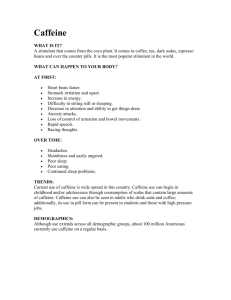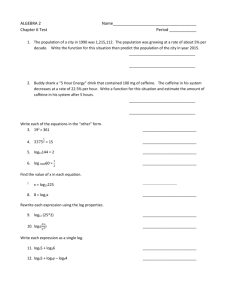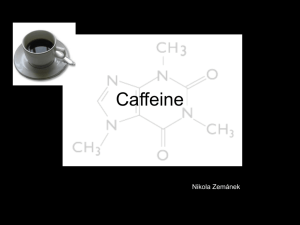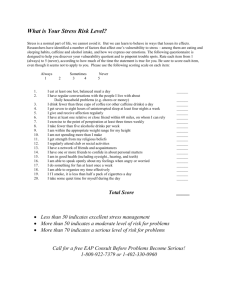Rhetorical Analysis Essay - Caffeine Addiction is No Joke for Some
advertisement
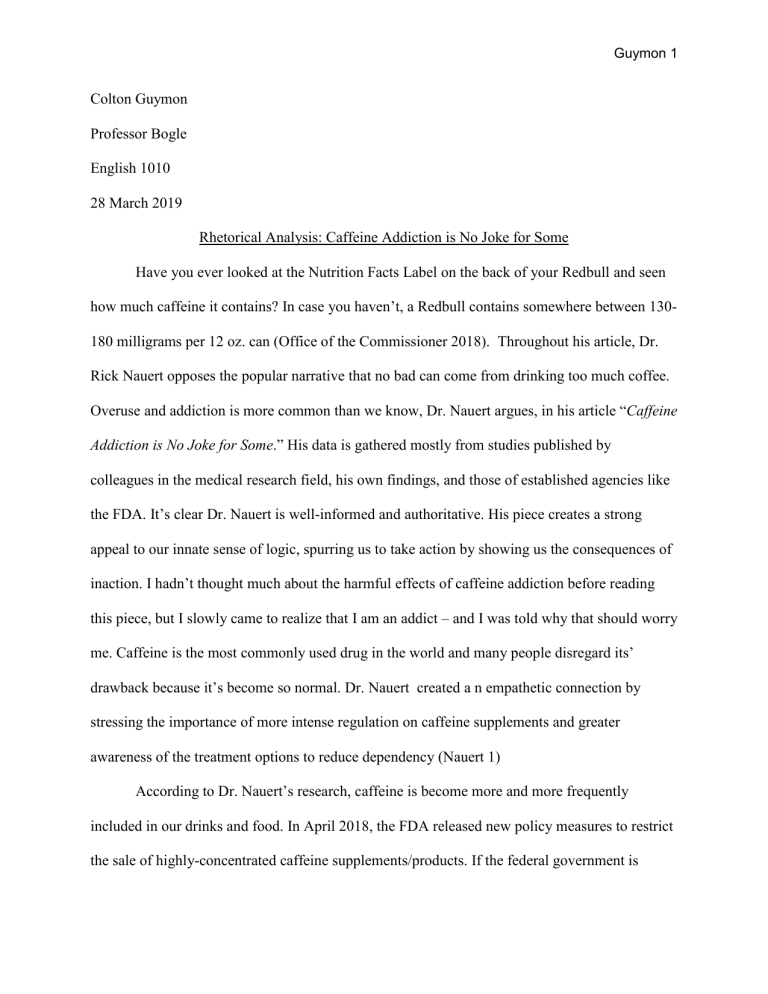
Guymon 1 Colton Guymon Professor Bogle English 1010 28 March 2019 Rhetorical Analysis: Caffeine Addiction is No Joke for Some Have you ever looked at the Nutrition Facts Label on the back of your Redbull and seen how much caffeine it contains? In case you haven’t, a Redbull contains somewhere between 130180 milligrams per 12 oz. can (Office of the Commissioner 2018). Throughout his article, Dr. Rick Nauert opposes the popular narrative that no bad can come from drinking too much coffee. Overuse and addiction is more common than we know, Dr. Nauert argues, in his article “Caffeine Addiction is No Joke for Some.” His data is gathered mostly from studies published by colleagues in the medical research field, his own findings, and those of established agencies like the FDA. It’s clear Dr. Nauert is well-informed and authoritative. His piece creates a strong appeal to our innate sense of logic, spurring us to take action by showing us the consequences of inaction. I hadn’t thought much about the harmful effects of caffeine addiction before reading this piece, but I slowly came to realize that I am an addict – and I was told why that should worry me. Caffeine is the most commonly used drug in the world and many people disregard its’ drawback because it’s become so normal. Dr. Nauert created a n empathetic connection by stressing the importance of more intense regulation on caffeine supplements and greater awareness of the treatment options to reduce dependency (Nauert 1) According to Dr. Nauert’s research, caffeine is become more and more frequently included in our drinks and food. In April 2018, the FDA released new policy measures to restrict the sale of highly-concentrated caffeine supplements/products. If the federal government is Guymon 2 taking steps to curb caffeine intake, then clearly there is an issue at hand. Most people think of smoking or opioids as the leading addictive substances, but caffeine is actually the most widely consumed psychoactive stimulant in the world and people consume it at rates higher than ever. Dr. Nauert’s argument is made stronger by citing his own findings. While studying the properties of caffeine, he found that regular intake creates a dependency in the consumer -- forcing us to constantly drink more to gain the same buzz. “There is a misconception among professionals and lay people alike that caffeine is not difficult to give up. However, in population-based studies, more than 50 percent of regular caffeine consumers report that they have had difficulty quitting or reducing caffeine use” (Nauert 1). Dr. Nauert abruptly transitions from a scientific appeal to an emotional appeal. In early 2018, two Ohioan high school students suffered fatal heart attacks after ingesting too much preworkout. It’s hard to argue that caffeine is harmless when presented with evidence that it can kill. The story of these high schoolers illustrates the need for action. Nauert calls for measures to curb the production of highly concentrated products, temporarily returning to his logical appeal. He cites the absences of treatment facilities for caffeine addicts, even though the American Psychiatric Association officially recognized Caffeine Use Disorder as a health concern in need of additional research (Office of the Commissioner). At the same time, caffeine is added in increasing amount to everyday products and supplements, unbeknownst to those who drink it, a fact that Dr. Nauert is quick to ridicule. Citing federal law, manufacturers are currently not required to label the levels of caffeine in nutritional supplements – just like with the pre-workout supplement from the Ohio Case. By introducing his argument in the context of two actual deaths, Dr. Nauert’s appeal to both pathos and logos pulls at the reader’s capacity for empathy and reinforces the importance of raising public awareness. Guymon 3 It is clear that Dr. Nauert finds issue with the lack of regulation on caffeine. His writing alternates between logical argumentation and emotional shock. “We are part of the consumer group experiencing the negative effects of caffeine… we ignore the problem because it is a socially acceptable practice, well integrated into our customs and routines” (Nauert 2) Following his pattern of following emotion with logic, Nauert shares the findings of his own medical research. His study, conducted in early 2018, found that regularly consume more than 400 mgs (or 3 cups of coffee) per day can cause health complications such as insomnia, heart disease, anxiety, and depression. If you know someone who struggles with these issues, it’s hard to argue that the side-effects are positive! Every day we see examples of the “caffeine zombies” depicted in his case studies. Nauert knows we should be concerned and rounds out his argument by forcing us to acknowledge the logic begin his belief.. Nauert created a personal tie to the topic by forcing us to recognize the harm that caffeine can inflict on those around us. Dr. Nauert’s credibility is reinforced by the timeliness of his argument, publishing his article at a time of debate over the caffeine issue. At the time of publication, the American Psychiatric Association had recently recognized Caffeine Use Disorder (CUD) as a health concern in the Diagnostic and Statistical Manual of Mental Health Disorders–the standard classification of mental disorders used by mental health professionals in the United States. Dr. Nauert’s article was published a mere two months after this change in classification. The FDA also released a new set of regulations on the sale of caffeinated products within a month of Dr. Nauert’s publication. His article came right at the pinnacle of the federal debate surrounding caffeine consumption. By carefully planning his publication, Dr. Nauert reaffirms the timeliness and relevance of his argument. Guymon 4 Caffeine addiction truly is no joke; Dr. Nauert’s article could not have been more aptly named. As consumers, it has become our responsibility to educate ourselves on the benefits and dangers of the products we use. Yes, there exist institutions and agencies that oversee the marketplace and ensure no unnecessarily risky products come into our hands (or mouths). But these entities are not omnipotent or omniscient and cannot remove all the dangers. Dr. Nauert provides a well-researched and convincing argument to the debate over caffeine. He introduces a argument for caffeine reform – one that is not widespread or popular -- tied together by alternating appeals to logos and pathos. Dr. Nauert establishes his credibility as a Ph.D.-level researcher in the field then draws upon our emotions by showing examples of caffeineconsumption taken to extremes, hooking us with his real-life examples of overuse and dependency. He timed his piece to be released amidst changing federal policy and a growing debate over the safety of caffeine. It takes a skilled writer to so thoroughly persuade a reader in a relatively short piece and Dr. Rick Nauert accomplishes that. Caffeine Use Disorder is a real issue, one that we must take seriously. Read your food labels, check your energy drinks, have one less cup of coffee. Only by raising awareness can this issue to safely resolved. Guymon 5 Works Cited Nauert, Rick. “Caffeine Addiction Is No Joke for Some.” Psych Central, 8 Aug. 2018, psychcentral.com/news/2014/01/29/caffeine-addiction-is-no-joke-forsome/65142.html. Office of the Commissioner. “Consumer Updates - Spilling the Beans: How Much Caffeine Is Too Much?” U S Food and Drug Administration Home Page, Office of the Commissioner, 12 Dec. 2018, www.fda.gov/ForConsumers/ConsumerUpdates/ucm350570.htm.
